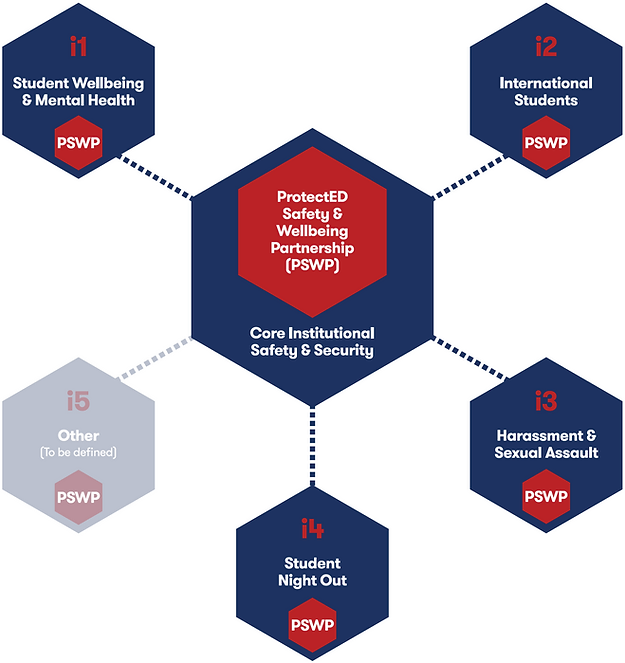ProtectED is an award-winning not for profit and accreditation organisation. They work to improve standards in student safety, wellbeing, and security across the Higher Education sector.
The student-centred approach of ProtectED recognises that universities have a role in supporting the safety and wellbeing of students, both on and off-campus. Students need support from universities throughout their studies so they can complete their course. This is particularly the case when it comes to care leavers and estranged students. We spoke to Lisa Ravenscroft, Communications Manager at ProtectED about their awareness raising work with universities. She shared helpful tools for improving safeguarding standards, making specific reference to the unique circumstances of care leavers and estranged students.
MGC: Could you tell us about how you work with founder member universities to improve student wellbeing?
Lisa: ProtectED itself was created through working with other agencies. We took a lot of advice from others and worked with groups like NUS, Studentminds, and British Council. It came about because one of our directors spoke to the Head of Security at the University of Salford about how there were no legal requirements in place that universities have to comply with regarding the safety of students. He then formulated a plan and worked with Salford University, interviewing over a thousand students to identify five key areas where students need help. These areas went into our code of practice.
Our code of practice is:
- Core institutional Safety and Security
- Student wellbeing & mental health
- International students
- Harassment and assault
- Student Night Out

These areas cover a holistic approach to supporting student welfare. ProtectED also recognises that student support doesn’t come from one area at a time. Instead, the points of the code of practice need to work together to provide the best care for students.
For example, if a student is harassed on campus, this would concern both their security and the mental health support that is given to them following the incident. Therefore, it is important for the teams to work cohesively and with external bodies such as the police or NHS if the incident calls for these bodies.
We work with the universities to improve these services and to ensure that these services are actually in place. This is to ensure they are giving the best possible support to students to keep them as safe as possible at university.
Only 6 universities in the UK actually have the recommended CCTV for their campus.
Lisa Ravenscroft
At ProtectED we don’t think that you can take student welfare issues on their own to provide singular services. You cannot provide independent services to support students just to fill a quota expected by the university. Providing one area of support such as mental health to the student is good, but it only works if the student welfare support is provided in the other areas of the code of practice.
By working with the universities through the code of practice, we are able to help them identify services that need improvement. If the services are already in place then they can understand how welfare teams can work better together to form the holistic approach needed to better student welfare.
MGC: What have been ProtectED’s key successes so far in establishing partnerships with universities to promote student safety and wellbeing?
Lisa: For us, it’s the universities working with the code of practice to improve their services. There’s been a lot of different ideas and projects that have come out of working with the code of practice to improve student welfare. Their programmes all work differently and act as examples to other universities that can encourage and promote the improvement of welfare services across the sector.
Working with the code of practice helps universities evaluate their services to find out what practices are and aren’t working. This not only improves services, but also promotes cost efficiency at the institution. One partner university we work with identified two departments that were running the same welfare programme for students, [both of] which students weren’t actively using. They had the programme to fulfil requirements, and it was effectively wasting money as people were not using it. The code of practice helped them recognise new ways to improve welfare services which could save them money in the long term.
Assessing services helps identify not only the weaknesses of services but if they are something the students want themselves. Therefore helping universities create welfare programmes that students use, justifying the cost of the programmes.
MGC: What are some of the issues estranged students and care leavers face when starting university? Did these issues change due to the pandemic?

Lisa: We work quite closely with the charity Stand Alone. Stand Alone support young people who are estranged or have been disowned by their family. They advocate for students going to university and have built meaningful relationships with universities to improve research and understanding of the needs of estranged students when they go to university.
When students go to university, the main problems they face are financial. A lot of students face these problems, but these issues are more pronounced for care leavers and estranged students. Some legislation has been brought in for care leavers, namely the Care Leaver Covenant (2019) pledges to provide employment and education opportunities to young people leaving care.[1]However, support like this for estranged students is still lacking in comparison.
It is harder for estranged students to prove they are estranged students. In some cases, the universities and financial aid ask for information from the family which obviously is not possible as the student is estranged from them.
Lisa Ravenscroft
Going to university and preparing to go to university is a big thing for any young person, but it is even harder for estranged students. Whereas often, other students have help with the preparation and move from family, estranged students have to complete the transition independently. Mental health support is key for them in that respect, they need more support adjusting to the new environment as they are alone.
This support was especially needed throughout the pandemic as estranged students were still on campus whilst most others went home. This was not possible for estranged students, and it was especially hard for those living in halls because very few people stayed on campus.
Some universities we work with moved students into one block of halls to provide better support to them and students had more of a community around them. This was also safer for the students as if an incident did happen then security teams could get to students easily. Having all the students in one place too benefitted their mental health since they were less isolated away from one another.
Security teams then provided them with support too, often delivering food parcels and medicines to students who had tested positive. They regularly checked in with them to understand how they were doing, providing the welfare support students still needed. The aid they provided to students was an extension of the work many security teams already carry out on campuses every year during term holidays.
The help security provided students helped illustrate the many roles they have in higher education that go beyond what is typically expected from them. Campus security is there to both physically protect and provide 24-hour support to students on campus. To reflect this, part of the code of practice for security is that we encourage them to go on mental health and suicide prevention training. This better equips them to support students and to understand how different situations would impact them when providing the support.
MGC: How can a whole institution approach towards care leavers and estranged students help universities welcome these students?
Lisa: Care leavers have a lot of support from universities that has been outlined in legislation, but this isn’t enough. Similar to estranged students, going to university can be a hard transition to adjust to for care leavers. Mental health support is vital to ensure an easy transition to university and that the students feel a part of campus life.
Both estranged students and care leavers might not wish to talk about their situations, though it is beneficial for them to disclose their status to the university. This is so the university can provide the best support possible and security are equipped with more knowledge to keep the student safe.
By making themselves known, security knows to support the students throughout the holidays if they are staying on campus. Not only that, but with estranged students, security know not to disclose their information to people who may ask for it, keeping them safe from family members who may wish to harm them.
When they graduate too, these students also need more support networks available at the universities. By signposting support networks, universities help them make the next step and apply for jobs since they don’t have the safety net of going home that most others benefit from.
It’s the start and end of university life that’s the most challenging for these students, just as it is for most others. As previously mentioned it’s important for universities to be aware of their situations so they are able to provide support to the students throughout their university experience.
Universities don’t judge students. They can provide better support to the student if they are aware of their status, helping them before, throughout and after their time at university.
Lisa Ravenscroft
MGC: How can universities better support estranged students to find accommodation when they do not have rent guarantors?
Lisa: We had a conversation about this on a recent webinar with Stand Alone and the Unite foundation since there is a lot of discussions at the moment about rent guarantors. In some cases, the university can be a guarantor, but this isn’t always an option. It’s incredibly difficult for estranged students to get guarantors for rental agreements.
Universities need to commit to providing on-campus support and accommodation to care leavers and estranged students.
Lisa Ravenscroft
The financial support systems in place in higher education need to be better looked at to assess for sustainable solutions. Though universities can be guarantors in some cases, this is not sustainable. Students need better financial support so they can pay full attention to studies rather than have to work to support themselves. In some instances students have had to work nights to support studies during the day, causing themselves to become ill as a result of stress and lack of rest. This is not sustainable.

The government need to address the problem to make university more accessible, reassessing financial systems in place for students.
Resources that outline financial paperwork for students are available on Standalone. If estranged students call the service then advisors can even talk them through the process of applying for certain loans and financial aid.
MGC: What can be done to help encourage universities to join the Stand Alone pledge to support care leavers and estranged students?
Lisa: All universities need to talk to Standalone and have a look at what they do. They need to share their resources and information with students so they know the organisation is there to support them.
Some students are actually unaware they qualify as care leavers or estranged students so are unaware they qualify for extra support. They struggle on trying to do everything on their own when they shouldn’t have to do that.
An issue most universities face is that they don’t let students know about all the resources available to them. Before students even go to university, they should be aware of the systems in place to support them if they do decide to attend.
Working with Stand Alone, universities have access to a free invaluable resource. They can provide training and workshops to the staff so they can better support care leavers and estranged students. This makes the university a more welcoming environment and helps the university recognise how they could provide better support for these students.
Stand Alone further offer the opportunity for staff and students to learn from lived experience. Many of the resources available on the site are provided for by estranged students who have had help from them in the past.
Key takeaways:
- Student welfare needs to be holistic, true support for students can only happen if the areas covered in the Code of Practice work cohesively.
- Universities can better support care leavers and estranged students if they are encouraged to disclose their status to the university when they start.
- There needs to be a reassessment of the financial systems available to students, so better financial support can be provided to those who need it.
- All universities should engage with Stand Alone. They need to share their resources and information with students, so they know the organisation is there to support them
Register FREE to access 2 more articles
We hope you’ve enjoyed your first article on GE Insights. To access 2 more articles for free, register now to join the Government Events community.
(Use discount code CPWR50)




